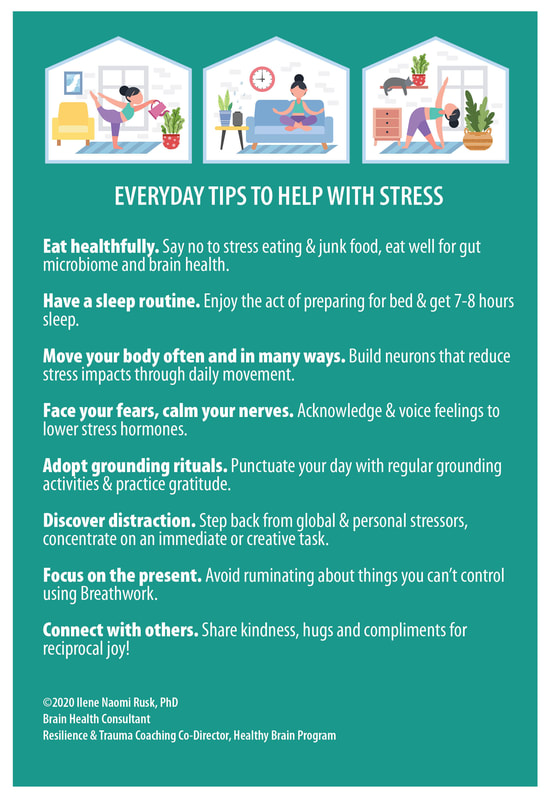|
How many times have you thought about how stressed you feel these days? Without a doubt, our lives on so many fronts are, and already were, often extremely stressful. And unfortunately, the ongoing COVID 19 events have only exacerbated the impacts with so many people around the world worried about their livelihoods and futures as well as their health. I found this excellent article by Markham Reid to offer a fascinating perspective about the research that shows just how stress drives body and brain responses to revert to old habits and patterns that inherently demand less from a brain that is already under siege. Change is hard and when we are dealing with a barrage of difficult issues, it’s just easier to assume the habits we hold familiar. So adopting a healthy lifestyle becomes even more important in order for these positive behaviors to be the very habits we embrace especially when under stress. But as Reid reminds us, even those with the most vibrantly healthy lives can have challenges given that “habit memory can be rigid and inflexible,” despite knowing just critical it is to adapt in an ever-changing environment that we all know the importance of adaptability in our ever-changing world and extremely trying times. The combination of these things just serves to contribute to depression, anxiety, obsessive compulsive disorders and numerous other health conditions that can last even after stressors are removed. Head of the Healthy Brain, Rehabilitation and Psychotherapy Treatment programs at The Brain and Behavior Clinic – Boulder, Colorado, Dr. Ilene Naomi Rusk also is director of the Healthy Brain Clinic. She explains, “The stressed-out brain defaults to old patterns as a way to preserve energy during stressful times. Both novelty seeking and practicing new habits are especially hard during times of stressful challenge. We want to conserve our energy. Stress and trauma are on a continuum, so conserving energy is an adaptive thing to do if you anticipate that you’ll need to shore up energy to fight or flee a situation. Unfortunately, this tendency for the stressed out brain to fall back on old habits has been extremely detrimental for our patients with cognitive decline. One of the most important components of maintaining brain health from a ‘habit point of view’ is to do NEW cognitive, behavioral and social things!” However, not all activities are created equal or positive; in fact, research has linked some activities to a decline in mental flexibility. As Reid’s article notes, media multitasking is one of these, citing a 2018 study from Texas A&M University and Jesus Lopez, first author of that study and a graduate researcher at the university, “The more an individual media-multitasks” — for example, someone might text or check email while watching Netflix — the more cognitive flexibility seems to be decayed.” Similar research has shown that using social media, working on our computer whether we’re answering emails or checking online shopping sites for the latest sales can cause for some people stress-inducing behaviors and lead to reduction in cognitive flexibility and brain health.  So, what is the solution? There are ways including meditation, prayer, “unplugging” and more to help you develop new strategies for coping with stress and that actively benefit our brains: Meditation and mindfulness: People have been meditating for thousands of years, often as part of a spiritual practice. But in more recent years, mindfulness has become a popular and effective way to help people manage their stress and improve their overall well-being. Mindful.org defines mindfulness as “the basic human ability to be fully present, aware of where we are and what we’re doing, and not overly reactive or overwhelmed by what’s going on around us.” In numerous research studies, psychological scientists have found that mindfulness actually influences two different stress pathways in the brain, changing brain structures and activity in regions associated with attention and emotion regulation. We know too that mindfulness training actually may enhance cognitive flexibility, which is the brain’s ability to appropriately adjust thinking and behavior according to changing circumstances and is linked to improvements in attentional functions as well as cognitive flexibility.1 Dr. Rusk notes that new studies suggest an intensive guided practice involving one-hour long meditation, 3 times a day for immediate results just in days.2 Other studies indicate that only 30 minutes of daily self- or guided practice leads to noticeable brain function changes after 2 weeks.3 Additional employer-based studies have shown promising results in cognitive performance following just a few minutes of daily meditation.3 It seems that almost everyone can improve their overall wellbeing, stress regulation and improve their brain function through regular meditation or prayer. She also cautions that habits can be very difficult and slow to change – so give yourself time to adjust! We have to feel the yearning to change, and deliberately create new cues and rewards to help us succeed in changing a habit. Having a clear goal can help the process. Stress relief and developing more self-awareness are noble goals during challenging times. One of the primary necessary ingredients to reap the benefits of meditation or prayer is consistency. Start small, practice, repeat. Try to start with as little as 2 minutes of prayer or meditation at a set time each day, pausing afterwards to take in the positive feelings of the experience. Such small bursts of concentration allow you to channel your enthusiasm into keeping consistency rather than sustaining a lengthy practice, thus setting you up for longer-term success. Prayer: If prayer is already an integral part of your life or something you’ve thought about including, we suggest reading How God Changes Your Brain by Andrew Newberg, MD and Mark Andrew Waldeman. In this fascinating book the authors discuss among numerous ideologies, research that shows: a. Prayer and meditation permanently change numerous structures and functions in the brain, altering your values and the way you perceive reality. b. Fundamentalism, in and of itself, can be personally beneficial, but the prejudice generated by extreme beliefs can permanently damage your brain. c. A connection to something greater than yourself offers more than just hope — it strengthens emotional health, too. d. Prayer and meditation permanently change numerous structures and functions in the brain, altering your values and the way you perceive reality. e. Not only do prayer and spiritual practice reduce stress and anxiety, but just 12 minutes of meditation per day may slow down the aging process. f. Contemplating a loving God rather than a punitive God reduces anxiety, depression, and stress, and increases feelings of security, compassion, and love. Remember though that you don’t need to impose rigid parameters upon your practice. Dr. Rusk emphasizes not to expect a particular outcome from either prayer or meditation. Rather, it’s important to stay open and focused upon the experience rather than a particular result…and the documented benefits like improved focus and stress management will come. New cognitive activity paves the way for new connections in the brain. But these types of brain changes don’t happen overnight, so she cautions patients to be patient! Gradual improvements in mood, thinking, or focus can be difficult to notice and many meditators report noticing the profound differences meditation has on their lives only after they miss a few meditation sessions. Her guidance also notes how neuroscientists often use the maxim offered by Donald Hebb that “neurons that fire together, wire together”, which describe this long-term adaptive brain change. Repeated practice creates repeated patterns of neural activity, which strengthen particular neurologic and psychological pathways while helping to create a strong brain and body for other daily activities such as emotional control and concentration. Everyday tips to destress: Engage and unplug: While technology can have its advantages, it can also disconnect us from real connections. And as we’ve previously detailed, there are other types of issues inherent to things like 5G technology. Try these ideas to truly unplug from all those things that whether you realize it or not can cause us great stress. -Interact with others socially (in person if at all possible!) -Participate in regular physical activity and seek out novel experiences to enhance cognitive flexibility (and even physical flexibility too, like yoga and dance). There are many ways to get up and get away from not only the devices that bind you to a more sedentary and potentially unhealthy life. -Rediscover nature in all its beauty and soul-rewarding splendor. Even a few minutes in your own backyard or at a nearby park can be helpful so you don’t need to live near a forest to reap the benefits. If you have a dog, they’d love a walk or run. -Get creative – even if you’ve never drawn or tried your hand at crafts or knitting, these types activities are great for brain strengthening and destressing. -Share a conversation and preferably a joke or funny story with a friend or loved one that allows you to laugh and laugh loudly! Perhaps one of the most important things about which we should remind ourselves is to never lose hope, without which none of us could survive. We must continue to focus on whatever positives come into our life, no matter how small they may seem at the time. Hope is not only good for our soul, it really is good for our brain. And in the face of stress, hope – and love - can prove to be a super defense!
In health, Dr. Suzanne Gazda & co-author, Dr. Ilene N. Rusk References, reading and resources: 1 Moore, A., Malinowski, P. Meditation, mindfulness and cognitive flexibility. Consciousness and Cognition. (March 2009) Vol. 18, Issue 1. Pages 176-186. https://www.sciencedirect.com/science/article/abs/pii/S1053810008001967?via%3Dihub 2 Kwak, S., Kim, S., Bea, D., Hwang, W., Cho, K. Lim, K., Park, H, Lee, T., Kwon, J. (2020). Enhanced Attentional Network by Short-Term Intensive Meditation. Frontiers in Psychology, 10. 3 Reynolds, G. (2016). How Meditation Changes the Brain and Body. New York Times. More blogs: https://www.suzannegazdamd.com/blog/mindfulness-and-ms https://www.suzannegazdamd.com/blog/the-integral-neural-connection-between-exercise-and-brain-health Headspace app https://www.headspace.com/ Guest article, Dr. I. N. Rusk https://www.suzannegazdamd.com/guest-articles/sculpting-the-brain-through-prayer-or-meditation-by-dr-ilene-naomi-rusk Afonso, R. F., Kraft, I., Aratanha, M.A., Kozasa, E. H. (2020). Neural Correlates of Meditation: a Review of Structural and Functional MRI studies. Frontiers in Bioscience (Scholar Edition).
1 Comment
10/24/2020 10:23:36 am
Thank you for this helpful and practical overview.
Reply
Your comment will be posted after it is approved.
Leave a Reply. |
AuthorDr. Suzanne Gazda, Integrative Neurology Archives
February 2024
Categories |




 RSS Feed
RSS Feed